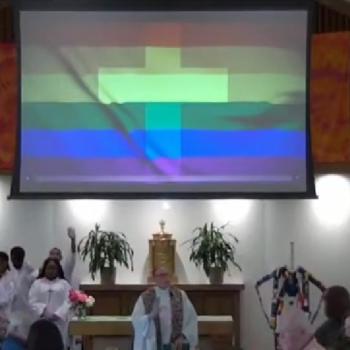
A recent article in First Things by Princeton professor Robert P. George explores the possibility of overturning the Supreme Court’s 2015 decision in Obergefell v. Hodges, which enshrined same-sex marriage into law. George argues that Obergefell, like Roe v. Wade, could be overturned. In this essay, I evaluate each of his main arguments and ask readers (especially Catholic readers) to weigh in.
Obergefell v. Hodges
The 5–4 majority opinion—written by Justice Anthony Kennedy and joined by Justices Ruth Bader Ginsburg, Stephen Breyer, Sonia Sotomayor, and Elena Kagan—ruled the following regarding same-sex marriage:
- Personal autonomy includes intimate choices, such as whom to marry.
- Marriage between two people (regardless of gender) offers dignity.
- Same-sex marriage safeguards children in such households.
- Marriage is a cornerstone of social order and should include same-sex couples.
The majority argued that the institution of marriage evolves and that the denial of marriage to same-sex couples harms their dignity—a claim grounded in public harm theory. They also included a carveout for religious institutions to dissent from or abstain from participation in same-sex weddings under the First Amendment.
The Dissenters
The dissenting justices (Chief Justice John Roberts, and Justices Antonin Scalia, Clarence Thomas, and Samuel Alito) offered the following objections:
- The Constitution does not define marriage, so the Supreme Court cannot impose one (Roberts, Scalia, Thomas).
- Marriage policy belongs to voters and legislatures, not the courts (Roberts, Scalia, Thomas).
- The majority’s ruling represents judicial overreach by imposing same-sex marriage nationwide and bypassing the democratic process (Scalia, Thomas).
- Marriage should remain within the states’ jurisdiction and is not protected under the Constitution (Thomas, Scalia).
- The ruling endangers free speech and religious expression (Alito, Scalia, Thomas).
- Neither the Due Process nor Equal Protection Clauses support a redefinition of marriage (Alito, Scalia, Thomas).
- The decision will lead to serious legal and social complications (Alito, Scalia, Thomas).
In short, the dissenters viewed the majority’s actions as judicial activism—legislating from the bench. Justice Thomas echoed this point in Dobbs v. Jackson Women’s Health Organization (2022), the case that overturned Roe v. Wade. He plainly stated:
In future cases, we should reconsider all of this Court’s substantive due process precedents, including Griswold, Lawrence, and Obergefell.
Professor George’s Case Against Obergefell
Professor George gives three primary reasons why Obergefell must be overturned:
- In agreement with Justice Thomas, he sees Dobbs as a precedent for correcting prior judicial overreach.
- Recent Gallup polling suggests that public opinion among Republicans is shifting away from supporting same-sex marriage.
- A growing backlash exists against radical extensions of LGBT ideology, such as biological males in women’s spaces and schools promoting one-sided pro-LGBT narratives.
George hopes that a traditional-marriage-affirming state (like Louisiana) will eventually bring litigation before the Supreme Court, triggering Obergefell‘s reversal.
He concludes:
So, as we mark the ten-year anniversary of Obergefell, those of us who embrace the traditional conjugal conception of marriage have cause to be hopeful. We should certainly resist the temptation to view the redefinition of marriage as a permanently settled issue. It is too important a matter to allow it to be settled in a way fundamentally out of line with moral truth.
My Assessments:
Judicial Overreach
This is George’s strongest point. Like Roe, the Court bypassed the legislative process to establish a new national policy. While such judicial moves may advance progressive causes in the short term, they expose themselves to reversal when reviewed by a less activist Court. I agree that Dobbs opened the door to revisiting Obergefell.
Shifting Public Opinion
According to Gallup, Republican support for same-sex marriage has dropped to 41% (down from 55% in 2022). There is now a 47-point partisan gap on the issue between Republicans and Democrats, the widest in the 29 years Gallup has tracked it. Meanwhile, young people (especially young men) are increasingly trending rightward. Clearly, the tide may be shifting in favor of revisiting Obergefell.
Cultural Backlash
Traditional values are increasingly winning in the courts and legislatures. George writes:
Americans are waking up to the illiberal tactics—everything from invading churches to stigmatizing believers in marriage as a conjugal partnership as ‘bigots’—of the organizations that forced same-sex marriage on us by judicial fiat.
He adds:
On top of all that, the Dobbs case, in which the Supreme Court three years ago reversed Roe, renders constitutionally vulnerable any case that rests on the judicial fabrication of ‘rights’ lacking any basis in the text, logic, structure, or original understanding of the Constitution. That describes Obergefell perfectly.
In short, the activists who pushed for Obergefell may have overplayed their hand. Their subsequent push for increasingly radical changes has triggered a growing backlash. That backlash, combined with Obergefell’s weak constitutional grounding, suggests the fight for traditional marriage is far from over.
Final Thoughts
So, I ask you, dear reader: does Professor George’s case hold merit?
Many once thought the rights granted in Roe v. Wade were set in stone. Dobbs proved otherwise. Now, we are again confronted with rights “lacking any basis in the text, logic, structure, or original understanding of the Constitution.” Will Obergefell go the way of Roe?
Must Obergefell go?
Thank you!
If you liked this article, please leave your comments below. I am very interested in your opinion on this topic.
Read The Latin Right’s other writing here.
Please visit my Facebook page and IM your questions (and follow my page) or topics for articles you would like covered.












